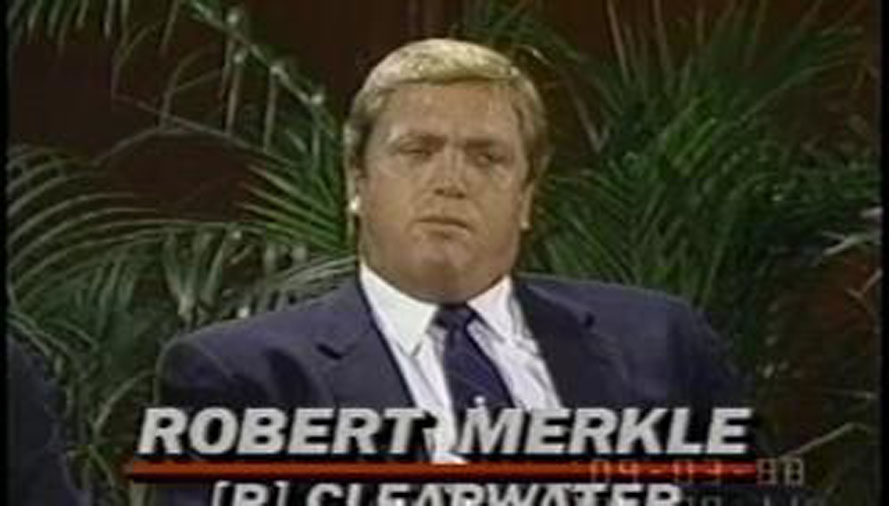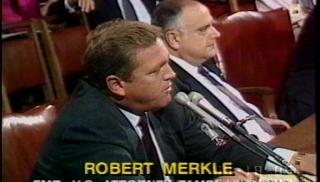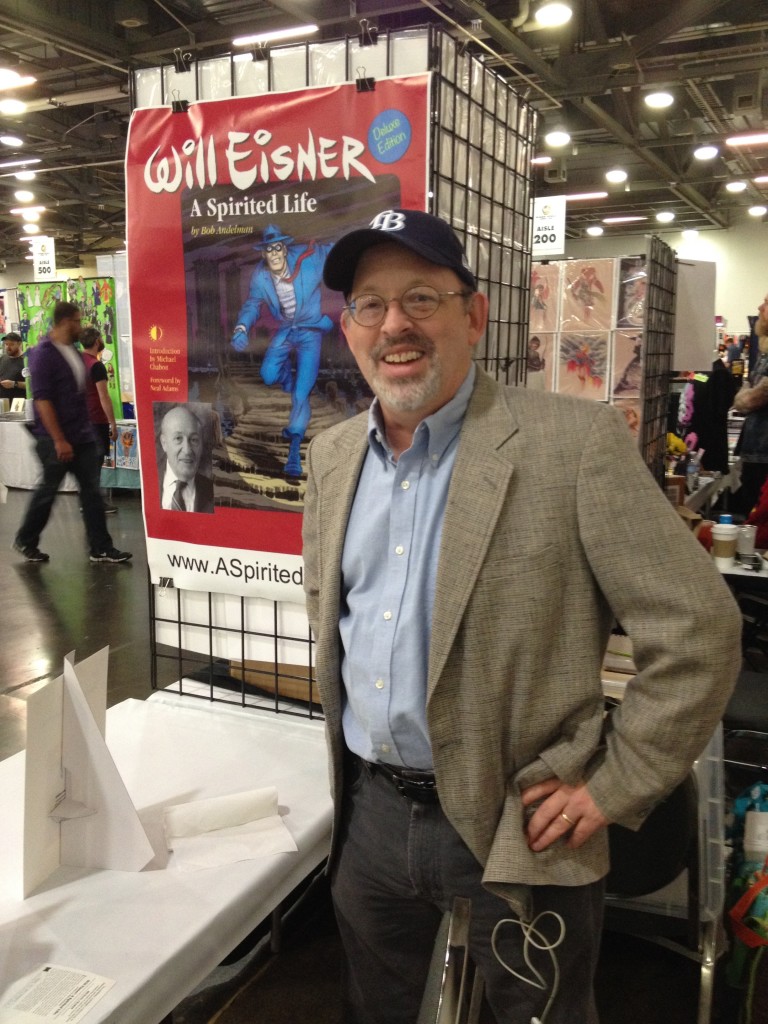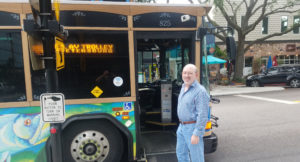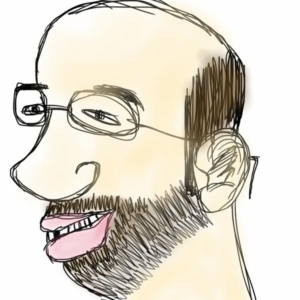(Originally written in November 1989 for Florida Business/Tampa Bay; also published the same year in the Orlando Sentinel Sunday magazine. Merkle died at the age of 58 on May 6, 2003.)
The man who stared down Panamanian strongman Manuel Noriega, the man who sent Colombian drug lord Carlos Lehder to prison, the man who challenged Connie Mack for the Republican nomination to the U.S. Senate-yes, Bob “Mad Dog” Merkle-couldn’t turn on a telephone.
He’d never before seen a phone that ran on batteries. The federal government didn’t buy ’em that way.
That wasn’t Merkle’s only problem in setting up his first business since running a lemonade stand as a kid. There was all that governmental red tape, all the bureaus to visit and license fees to be paid. For a man who had spent his entire career in government, it was an eye-opening experience being on the other side.
Until he could afford a secretary, Merkle did his own typing. He rented office space within another law firm until he could get on his feet. Merkle only had two phones-one in his office and one for a parade of temporary secretaries. That left his partner, Joe Magri, in the cold. When someone called for Magri, he’d have to use Merkle’s phone and Merkle would have to wait outside the office.
Then there was the problem of research. Unable to afford their own law library, Merkle and Magri had to spend nights and weekends looking up cases in the Pinellas County Courthouse law library. “It was inconvenient as hell,” says Merkle. “It’s very inefficient having to leave your office, especially when you’re the only one there. You go downtown, look for a parking space then find you don’t have any change for the meter.” Merkle’s notoriety didn’t help; everyone he ran into wondered why the infamous attorney was doing his own searches through the stacks.
When they finally bought their own statutes, Merkle and Magri discovered a new problem: no room in their makeshift office for book shelves. So the lawyers took out the indexes and had to leave the rest of the books in boxes. To find something, whole cartons would have to be shuffled.
“It’s one of those things you look back fondly on,” says Magri, “and thank God it didn’t last long.”
Welcome to the world of private lawyering, former federal prosecutor style.
Among modern U.S. attorneys, only New York-based Rudolph Giuliani enjoyed more renown and infamy in the 1980s than Bob “Mad Dog” Merkle. While Giuliani played the game of federal prosecutor in a bigger arena, there are many similarities between him and Merkle, including national television profiles in 1987-Giuliani on ABC’s “20/20,” Merkle on CBS’s “60 Minutes”-and the failure of both to leapfrog from appointed to elected office. (Giuliani wanted to be mayor of New York in ’89; Merkle chased the role of U.S. Senator in ’88). Now both face at least the immediate future in private practice.
From 1982 to 1988, Merkle went after the biggest fish in the sea of 32 counties making up the Middle District of Florida. His office’s cases never failed to make headlines: the corruption trials of members of the Hillsborough County Commission and Nelson Italiano, a once-prominent figure in Hillsborough County Democratic politics; drug indictments brought against Lehder, Noriega and ex-baseball star Denny McLain; perjury charges against State Rep. Elvin Martinez; investigation of former Hillsborough State Attorney E.J. Salcines; and the prosecution of plastic surgeon Dr. Dale B. Dubin on child-pornography charges.
“We didn’t win all the cases, but nobody does,” says Merkle. “It was claimed I only went after Democrats, that I only went after lawyers-depending on whose ox was being gored, that defined ‘the problem with Merkle.’ If there’s a rap there, it was that I went after everybody. Nobody was above the law.”
Merkle was the first U.S. attorney to successfully extradite and prosecute a member of Colombia’s feared Medellin Cartel. The life sentence drug lord Carlos Lehder received in 1988 was a precursor of the bloody civil war that has since wracked Colombia.
When he won, Merkle lavished compliments upon the American legal system, judge and jurors. When he lost, Merkle explained it away by saying the jurors and judge didn’t understand the case.
Along the way, many respected voices called for his firing, including Florida Governor Bob Martinez (cross-examined by Merkle in the Italiano case), Barry Cohen (Salcines’ attorney), a majority of Florida’s sheriffs, the Tampa Tribune and the St. Petersburg Times. Senators Bob Graham and Lawton Chiles were openly critical of Merkle. (The Times eventually recommended Merkle over Connie Mack in the Senate primary; he refused to accept.)
Clearly, not everyone will be rooting for Merkle to succeed in private practice. Not Tampa attorney Barry Cohen, who sought Merkle’s removal from office with a full-page newspaper ad and petition campaign after the U.S. attorney’s three-year, public investigation of Cohen;s client, E.J. Salcines, damaged the former Hillsborough State Attorney’s reputation. Merkle never brought charges against Salcines, but all the negative publicity probably costing Salcines re-election.
Although Cohen declined comment for Florida Business, he did describe to Morley Safer of “60 Minutes” what he called Merkle’s “McCarthy mentality.” On the nationally broadcast television program, Cohen accused Merkle of ” … inducing people to tell untruths … threatening people that they’ll be indicted if they don’t tell you what you want to hear so that you can manipulate the facts … telling witnesses that you’d better testify in a particular way.”
Merkle and Magri have both had run-ins with Cohen over the years. They say Cohen is an expert at trying cases in the media. “Barry Cohen is a good defense attorney in that he knows how to utilize the media,” says Magri. “He gives talks on how to use the media to help defend a case.” Cohen used a Florida Bar seminar in October as a forum to criticize Pinellas-Pasco Chief Assistant State Attorney Richard Mensch for prosecuting chiropractor William LaTorre as a way of getting back at Cohen for winning a drug case.
After leaving office, Merkle continued to lose friends and influence enemies. He called his former boss, Attorney General Edwin Meese III, a liar and described Connie Mack and Bob Martinez as a “dynamic duo of sleaze.” When Mack refused to debate him, Merkle traveled the state with a lifesize representation of Mack, which he dubbed “Cardboard Connie.”
Whatever his faults, the sleepy-eyed, sharp-tongued Merkle has never been dull.
* * *
Merkle, a graduate of Notre Dame and reserve fullback on the football team in 1964, spent 17 years in professional law enforcement as a trial attorney for the U.S. Department of Justice and as an assistant state attorney in Pinellas County for the Sixth Judicial Circuit before being recommended by then-Senator Paula Hawkins to be U.S. Attorney for the Middle District of Florida in 1982. Merkle left office in mid-1988 to challenge Connie Mack for the Republican nomination for the U.S. Senate, which Mack later won.
After the campaign, Merkle set about finding a job to feed his wife Angela and their nine children. He set up an independent law office in downtown Clearwater and, at age 45, began competing for the first time for clients.
Merkle has done his best to make the setting of private law as similar to public work as possible. He took on his former chief assistant, Joe Magri, as equal partner and hired his former secretary, Dot Bunger, as office manager. Also joining the firm from the U.S. Attorney’s office was Ward Meythaler, who spent five years as an assistant under Merkle; Jeff Albinson spent five years as an assistant state attorney in Pinellas County; Robert Persante, a nationally ranked chess player, folded his sole practitioner office in Tampa to sign on; Dayra Morales is the freshman member of Merkle & Magri, having just graduated University of Florida Law School.
The Merkle & Magri team goes back to a time shortly after Merkle’s appointment by Ronald Reagan in 1982. “I met him at a party that my law firm threw on Capitol Hill,” recalls Magri. An uncle of Merkle’s was a partner in Cummings and Lockwood, the firm where Magri worked. “We got talking about doing some prosecutions and it really sounded good to me. And he liked to play golf.”
Over the years, a good working relationship developed into a deep friendship and respect between the two men. “We complement each other well,” says Merkle. “There are certain talents he has and certain talents I have that mesh. It’s a very good relationship.”
Magri, 41, was promoted to acting U.S. attorney when Merkle left office in June 1988 to run for the Republican senate nomination vs. Connie Mack. Less than six weeks later, then-U.S. Attorney General Ed Meese announced Robert Genzman of Orlando would be the new U.S. attorney for the middle district of Florida. The announcement may have been timed to embarrass Merkle just days before the Republican Senate primary; Merkle has said he had an understanding with Meese that Magri would be his permanent successor. Had he known otherwise, Merkle has publicly suggested, he might not have left office. (Magri served as acting U.S. attorney until early 1989.)
“We’ve been about as close as two lawyers could be in terms of our working relationship over seven years,” says Magri. “I have a great deal of respect for his ethics, his approach to the law. He’s a very aggressive lawyer. He fights very hard for his position. I think he’s an exceptional lawyer.”
There are enough rooms with a Rocky Point waterfront view for five more attorneys in the spacious, 11th-floor Waterford Plaza law offices of Merkle & Magri. There is plenty of work to go around; Merkle himself is likely to surpassed his $70,000 federal salary in the firm’s first year of business. “I wouldn’t commit myself to significant salaries if I didn’t have the work to support it,” he says. Then, adds Merkle with a twinkling eye on the bottom line, “That’s a fundamental business decision.”
One of the advantages to private practice for an attorney with Merkle’s celebrity status is that it draws in all kinds of people with unusual problems. That is also the chief drawback of being Bob Merkle, P.A.
“I get people who, frankly, are nuts,” he says. “I had one guy who claimed he was the past owner of Amtrak, Yankee Stadium and the Skyway Bridge. This was a conspiracy to involve all sorts of people. I didn’t accept him as a client. I used to get these people at the U.S. Attorney’s office but I had a screening process where we could file a letter in the nut file and let it go.
“I spend an awful lot of time talking to people who have no intention, no wherewithal to hire me. They’re looking for emotional support, free advice.”
Then there are clients operating under what might be called “Mad Dog Fever,” which Merkle says has been spread by defense attorneys and newspaper reporters. The “Mad Dog” nickname began in his assistant state attorney days when he took on unwinnable cases and won them.
“My clients have hired me,” says Merkle, “because they perceived I was the meanest, nastiest sonuvabitch in the valley. They feel, ‘I don’t like you, but I want you as my attorney.’ They perceive that I can walk in, wave a wand and they get what they want. But that’s not the way the system works.”
Merkle insists he’s no frothing wild animal; it’s not practical. “I have always been in total control of myself in the courtroom. The image of a mad dog is certainly a repugnant image for a lawyer to have. A mad dog foams at the mouth and attacks everything in a mindless fashion.” The image has been built out of proportion but he hesitates to reject it entirely. “The good side is the way it was coined. It connotes tenacity and fearlessness. The irony is that that fiction hasn’t hurt my business,” he says. “But there’s another side of that. Sometimes when I walk into a courtroom, a judge who hasn’t met me operates on the same principle.”
Joe Magri is the perfect partner for Bob Merkle: he’s used to standing in the “Mad Dog’s” shadow. For seven years of federal prosecutions-successful or not-it was “Merkle this, Merkle that.” Guys like Magri and Meythaler worked just as hard but in relative anonymity. “Joe Magri deserves every bit as much credit as I do for what we did at the U.S. attorney’s office,” says Merkle.
In the private sector, the magnetism of Merkle’s name will be a mixed blessing. It will keep Magri in the shadows but probably make him a rich man.
“I don’t consider that a real issue,” says Magri. “If you want to talk about it from a business standpoint, an attorney that has the ability to attract attention generally attracts cases. That’s very good. That’s what we’re here for. If things go well for me and Bob does well, I’m going to be happy. What’s important is that the firm do well. If that results in Bob Merkle gaining publicity or continuing what he has, that’s something we should embrace.”
* * *
The days of chasing corrupt county commissioners and drug lords are over.
Bob Merkle has made a conscious decision to generally refuse criminal cases. He doesn’t want to belittle a long career of criminal prosecution by switching sides to defend drug dealers. Instead, he has chosen the more dignified civil arena, specializing in lender-liability, environmental and land-use litigation.
“There are obviously differences,” he says. “But there are some fundamental things that remain the same. A hearing is a hearing. A deposition is a deposition. The law is the law. Clients come to me because there’s the prospect of real litigation experience.”
Merkle says he’s not ruling out criminal defense work entirely, but he is unlikely to accept it unless “there is a situation where I can work to further both the client’s interests and the government’s interests at the same time. (Otherwise) it would be an abrupt and unacceptable jolt from what I’ve been committed to for my entire professional career. That’s a prospect when I’m using my skills to defend people who are otherwise guilty. I will not do drug work. I happen to have a personal experience in which I have a very high anti-drug profile. I don’t want to be in the position where I get people off as a routine manner of the way I work. I’m aware of the recidivism rate. I’ve known lawyers who’ve represented criminals and gotten them off. I don’t feel comfortable in using my talents to get these people off. Why should I be a mouthpiece for the Mob? Why should I be in-house counsel for a drug organization, insuring their people get back on the street?”
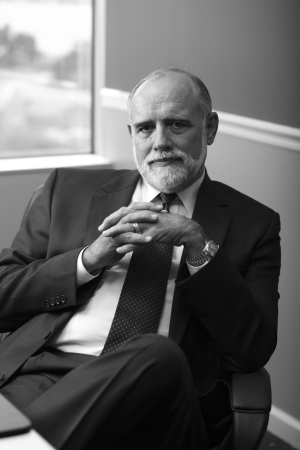
George Tragos, managing partner, managing partner at the Law Offices of Tragos, Sartes & Tragos, Clearwater
George Tragos was a chief assistant under Merkle at the U.S. attorney’s office; like Merkle, Tragos also put in time at the state attorney’s office. But when Tragos left the federal prosecution business, he had no trouble working for the other side.
“I made the transition from prosecuting criminals to defending criminals,” says Tragos. “I’ve done it twice. I just wake up one morning and see the Constitution from the other side. I see words I never saw before. I enjoy practicing law and I enjoy trying cases. I don’t care if I’m prosecuting or defending.
“Bob-his personality didn’t allow him to make that transition,” according to Tragos. “He’s a person that didn’t feel psychologically he could defend criminals. Some people can, some people can’t. (Merkle) has a very negative idea of criminal defense lawyers. If you’re talking political ambition, representing drug smugglers and criminals doesn’t get you a lot of votes. He’s doing the right thing not tarnishing his image as a crimebuster.”
Tragos believes that the different directions he and Merkle have taken has been largely responsible for the end of their social contacts. But, notes Tragos, “In the civil work I’ve done, some of the people I’ve met have been bigger crooks than in criminal.”
Denis M. de Vlaming is another former assistant state attorney who turned the tables on the system and now makes his living as a criminal defense specialist. He expects Merkle’s aggressive style and tactics will be preferred by a certain type of client and that the former prosecutor will do very well in private practice.
“I admire him for not accepting criminal cases,” says de Vlaming. “I’m sure Mr. Merkle could win six-figure fees for drug dealer cases.”
de Vlaming says he once had a client who had been charged with three different burglaries. The man was acquitted of the first two charges. This occurred when Bob Merkle was an assistant state attorney. “The third time, Merkle came in and said, ‘You’re not winning this one,'” recalls de Vlaming. “Judge Fred Bryson has since said it was one of the most enjoyable cases he ever had. We went after each other, nose to nose. And he topped me. He did a good job.”
* * *
Attorneys who have spent a portion of their careers in public service say there are a number of differences between working for Uncle Sam and Joe Shmo.
For one thing, there’s money. When you work for Uncle Sam, he pays all the bills no matter what the cost and whether or not he can cover the debt. That’s important when a Carlos Lehder can pay a reported $2.5 million for his defense. And there’s a regular paycheck to depend on, utility bills are paid and plenty of No. 2 pencils and yellow legal pads. In the case of Merkle and Magri, there were also 47 assistant U.S. attorneys to share the work load.
Joe Shmo, on the other hand, won’t necessarily pay his bill on time. He’ll pay it late if he can and it’s no fun for a dignified attorney to chase down deadbeat clients. And if the firm doesn’t get paid, there’s no blank check from the government to keep the wheels turning. It’s a quick lesson in business for lawyers who haven’t had to worry about such details in government service.
“When you’re a U.S. attorney,” says Merkle, “you’re here for the United States. You have a client who exists, from a certain perspective, in the abstract. When you are a private lawyer, you find out how many problems there are out in the world and how many there are that can’t be solved.”
When you’re with the government, you’re 100 percent lawyer. But when you’re in private practice, you’re 50 percent lawyer and 50 percent businessman. And the business responsibilities can really get out of hand.
“If you open an office and make lots of money, it’s easy. If you’re not making money, you have to budget,” says George Tragos. “I can’t operate at a deficit as the U.S. Government does. Nobody ever said, ‘You can’t do this drug smuggling (case) because we can’t afford it.'”
For attorneys who plan to stay in business and prosper-perhaps even drop a shoe in the political arena-there is an even broader agenda to be considered in private practice.
“You become very conscious of not just your role in a given piece of litigation,” says Joseph Donahey, a partner in Clearwater-based Tanney, Forde, Donahey, Eno and Tanney, “but the practice you see over many years, the relationships you have with colleagues, the relationships you have with the bench. Your approach is different. When you’re a prosecutor, you’re not beholden to anybody. You can approach each case in any manner you choose.”
There is also the growing issue of attorneys who make campaign contributions to judges. Merkle supports blind trusts for judges or judicial candidates so that the influence of law firms making large financial contributions could not give a hint of judicial impropriety. “I guarantee you’ll see contributions go down,” says Merkle. “I’m not going to indulge in the practice I’ve heard other lawyers do-routinely contributing to incumbents on the bench. Somebody may get their nose bent out of shape by my saying there are incompetents on the bench. But there are incompetents on the bench.”
A potential drawback for a Bob Merkle-type attorney shifting gears is the distinct lack of limelight surrounding most lawyer’s everyday affairs.
“One of the things you really have to develop a means of handling is the hum-drum routine of all our lives,” says Joe Donahey. “I’m looking at a mound of work. I have the same commitment to each of these files yet there’s probably only two that that any challenge or any meaningful legal interest.”
Not every case, in other words, is a international drug cartel or politician with his fingers in the cookie jar. The average lawyer rarely makes headlines.
Spending time on the government payroll has been lucrative for many people who earn huge consulting fees, write books or end up as partners in nationally respected law firms. Some simply add marquee value; some bring real insight.
George Tragos has says when Bob Merkle was appointed to be U.S. attorney, the two discussed Tragos’ joining the team. Tragos told Merkle he couldn’t afford the pay cut but ultimately used his savings to maintain the lifestyle which he had become accustomed to as a high-price lawyer. “It was worth it,” says Tragos in retrospect. “I made contacts all over the country. Now my business is 60 percent federal.”
* * *
There are many stories floating around that reinforce the “Mad Dog” nickname Merkle earned as a young buck coming up through James Russell’s Pinellas County State Attorney’s office in the ’70s..
“Bob Merkle in the courtroom was like a linebacker bursting through the line,” says Denis M. de Vlaming. “He’s extremely intense, almost physically imposing. When he argued, he would walk right up to you and argue. Almost to the point of intimidation so his opponent cowers. It’s a style that’s only his.
“I went snow skiing in Vermont with him one year. I don’t know if I’d go again,” says de Vlaming. “He has to go faster than you, he has to go further than you. He has to beat you at everything. We had an argument over dinner. He always has to be right. He carries over that competitive aggressiveness into every aspect of life.”
“The guy is an excellent trial lawyer,” says George Tragos. “But if I see him in an airport-as well as we know each other-I have to say hello first. He’s not personable. That’s just the way he is. But I like him.
“You have two schools of thought,” says Tragos. “There’s people who really hate the guy. And there’s people who think he’s the greatest thing since sliced bread. I think he did more good than bad. The people-they got their money’s worth with him. Not everything he did turned out right, but on balance, he did more good than bad.”
* * *
Is Bob Merkle merely on hiatus from public office? When he does run again, will it be for governor?
“Ah,” he answers, “the old question-resting-on-a-presumption trick.”
Those who know him best expect the “Mad Dog” to slip his leash again and run for office after feathering his private practice with a layer of cash insulation. “I personally think he’ll run for public office again,” says George Tragos. “I don’t think he can be happy so far out of the limelight. I don’t think money motivates him.”
Joe Magri—who knows exactly what his partner’s plans are—is cagier about making predictions.
“One of the important things in life,” says Bob Merkle’s law partner, “is that people who are doing that which they want to do tend to be the most happy and productive in life. If you spend the time swimming against your emotional current, you achieve less. I think it’s important for people to maintain the options that exist.”
If he does run again, Merkle will have to plan his next campaign better than his first, which began with just 70 days to go before the primary. (Connie Mack had been beating the hustings for more than a year.) The first campaign cost a remarkably paltry $70,000 but ate up Merkle’s federal retirement, money he lent to the campaign and another loan he is still paying off. But he has no regrets.
“It was an ad lib effort, an amateurish campaign by necessity. It was fun in that regard. I think I performed pretty credibly,” says Merkle.
Not surprisingly, Merkle isn’t ready to tip his hand. He certainly won’t rule out another shot at election-“it depends on a lot of things,” he says, then adds, “I have no intention of running for governor.
“I don’t have much patience with people who say, ‘You have to run for governor.’ I say, ‘Oh, yeah? Who’s going to feed my kids?’ I didn’t see anybody in October (after he lost the senate primary) offering to give me a hand. Not a soul. Bitter? No. Practical? Yes. I’ve been approached many times. I say, get real. Don’t talk ideals or how great I’d be. Talk the language. Talk about what I need to be an effective candidate. I’m a pretty tough, resilient guy. I was going 24 hours a day in that campaign. I’d be willing to do it again. But there’s got to be a germ of success. I’m not going to be somebody’s spear-carrier. There should be enough people now that know I’m a credible candidate.”
end
Bob Merkle Website • Wikipedia
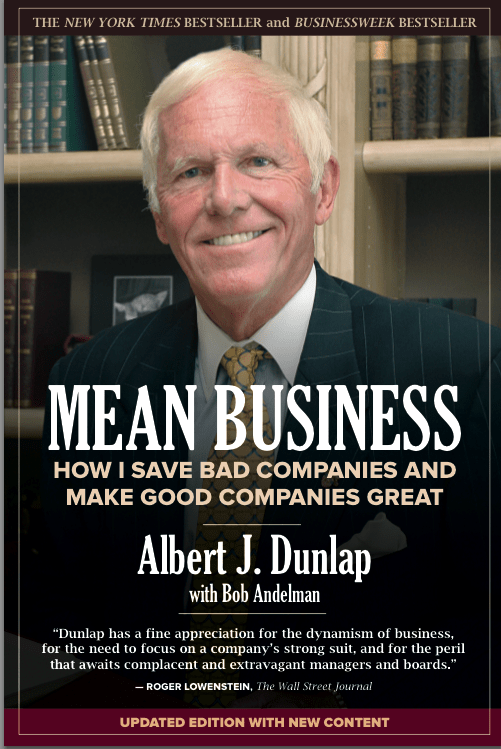
Mean Business: How I Save Bad Companies and Make Good Companies Great by Albert J. Dunlap with Bob Andelman. Order your copy now by clicking on the book cover above!
 The Party Authority in New Jersey, Pennsylvania, Delaware and Maryland!
The Party Authority in New Jersey, Pennsylvania, Delaware and Maryland!